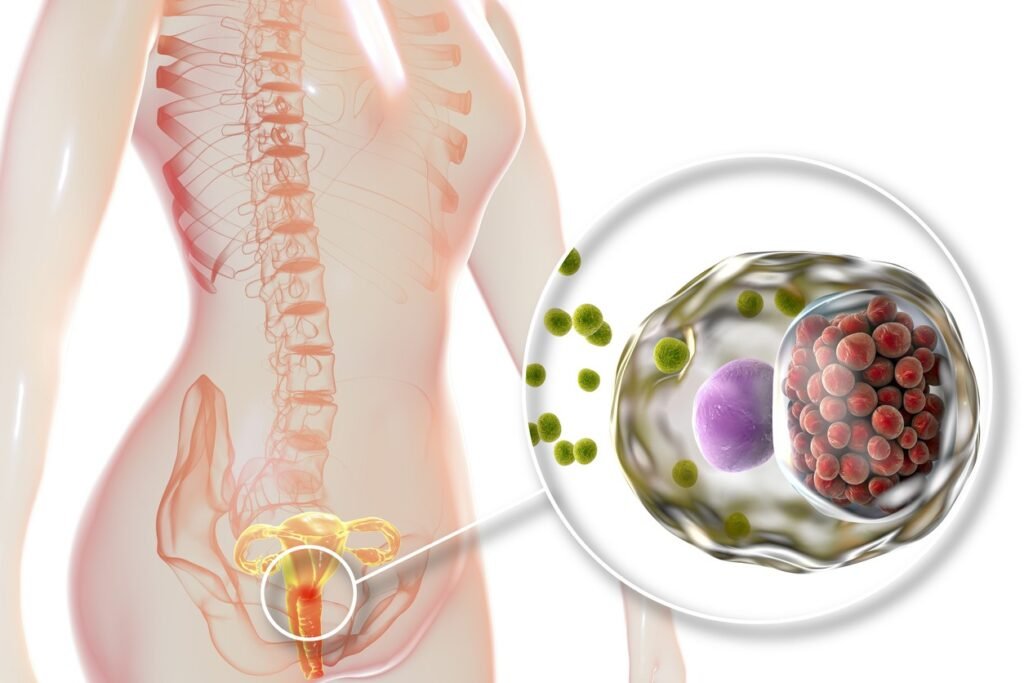Sexually Transmitted Infections (STIs) are infections that are primarily spread through sexual contact. They can be caused by bacteria, viruses, or parasites and may affect the genital area, rectum, or throat.

Common types of STIs include:
- Bacterial STIs:
- Chlamydia: Often asymptomatic but can cause discharge, pain during urination, and pelvic pain.
- Gonorrhea: Can cause similar symptoms to chlamydia, including discharge and painful urination.
- Syphilis: Typically starts with a painless sore (chancre) at the site of infection, which can progress to rashes and sores if left untreated.
- Mycoplasma Genitalium: Can cause symptoms similar to chlamydia and gonorrhea, including urethral discharge and pain.
- Viral STIs:
- Human Immunodeficiency Virus (HIV): Attacks the immune system, leading to AIDS if untreated. Early symptoms can resemble flu-like symptoms.
- Herpes Simplex Virus (HSV): Causes painful sores or blisters on the genital area or mouth. HSV-1 typically causes oral herpes, while HSV-2 usually causes genital herpes.
- Human Papillomavirus (HPV): Many types of HPV can cause genital warts; some can lead to cervical cancer or other cancers.
- Hepatitis B and C: Affect the liver and can cause symptoms ranging from mild flu-like symptoms to more severe liver disease.
- Parasitic STIs:
- Trichomoniasis: Caused by a protozoan parasite, it can lead to symptoms such as itching, discharge, and discomfort during urination.
Symptoms of STIs can vary widely and may include:
- Unusual discharge from the genitals
- Pain or burning sensation during urination
- Pain during sexual intercourse
- Sores, blisters, or rashes in the genital area
- Itching or irritation
- Flu-like symptoms or swollen lymph nodes (especially in the case of HIV or syphilis)
Diagnosis typically involves:
- Medical History and Physical Examination: Assessment of symptoms and sexual history.
- Laboratory Tests: Blood tests, urine tests, or swabs from the affected area to detect the presence of STIs.
- Imaging Studies: In some cases, ultrasound or other imaging may be used to assess complications or related conditions.
Homoeopathy Treatment
Here are some homeopathic remedies that might be considered for managing symptoms related to STIs:
- Mercurius: For symptoms associated with severe inflammation and discharge, often with a tendency for ulcers or sores in the genital area. It is also used when symptoms worsen at night or with a feeling of general malaise.
- Thuja Occidentalis: Often used for warts, including genital warts caused by HPV, and for conditions with a tendency to develop skin growths or lesions.
- Calcarea Sulphurica: For conditions with pus formation and slow healing of sores or ulcers, which can be relevant for some STIs with secondary bacterial infections.
- Cantharis: For painful urination and burning sensations, particularly if there is an intense, urgent need to urinate and the discomfort is severe.
- Sulphur: For itching, burning, and discomfort in the genital area, especially if there is a tendency for chronic skin conditions or inflammation.
- Natrum Muriaticum: For symptoms related to herpes simplex (cold sores) with recurrent outbreaks, particularly if there are emotional stressors involved.
- Arsenicum Album: For symptoms of discomfort, burning, and irritation, particularly if there is a feeling of weakness or anxiety accompanying the condition.

